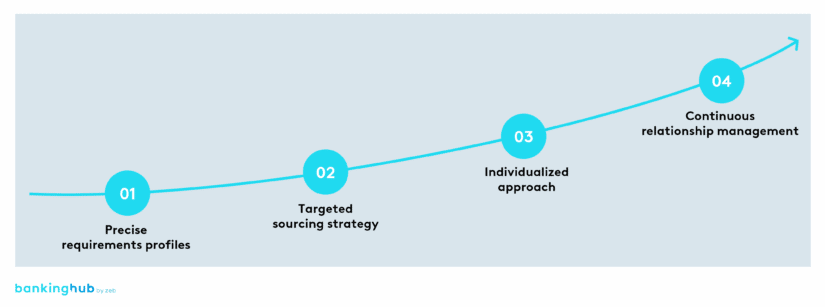Shortage of skilled workers as an existential risk across industries
Whether trade businesses, SMEs or DAX companies – the shortage of skilled workers is a huge challenge across all industries. The financial services sector is no exception. Major trends such as demographic change, new work concepts or increasing competition for qualified employees are contributing to the problem that key positions in regional banks are increasingly going unfilled, ultimately leading to an existential risk.
Against this backdrop, HR, with its focus on attracting suitable applicants, has a crucial strategic role to play. But the days when companies could choose the best candidates for vacant positions from hundreds of applications are long gone. Not only the number, but also the quality of application profiles is declining. Waiting for suitable applicants will no longer be an option in the future.
In view of current developments, a rethink regarding candidate sourcing is required at regional banks. Upcoming vacancies must be identified at an early stage in order to be able to initiate appropriate recruitment measures in a timely manner. Posting job advertisements alone is no longer sufficient: successful recruitment increasingly requires actively searching for and addressing qualified candidates.
BankingHub-Newsletter
Analyses, articles and interviews about trends & innovation in banking delivered right to your inbox every 2-3 weeks
"(Required)" indicates required fields
How does candidate sourcing work in regional banks?
A word in advance: candidate sourcing is not one particular method to recruit staff. Rather, it is a collective term for various methodological approaches that can be combined in a variety of ways. So far, regional banks have rarely adopted these approaches themselves, so they need to build the necessary expertise in their HR departments. After all, candidate sourcing managed from within the company is more promising than candidate sourcing managed by external HR consultancies.
In essence, candidate sourcing is about identifying and proactively addressing people who appear to be suitable for a vacant position, in order to recruit them for this position and retain them in the company in the long term. The advantage lies specifically in making the recruitment process more efficient by rendering it proactive.
Ultimately, it means that vacancies can be filled more quickly, costs (resulting from unfilled positions) can be saved, and the organization can reach qualified candidates who add immense value to the company but would not normally have applied of their own accord.
Candidate sourcing as a recruitment consultancy skill for regional banks: four success factors
1) Precise requirements profiles
A clear understanding of the requirements of the position to be filled is the ideal basis for a targeted direct approach of potential candidates. The focus here is primarily on the necessary skills and experience as well as professional and personal competencies that potential candidates should have in order to successfully master future tasks and be satisfied with their job in the long term. These can be identified as part of a requirements analysis and then condensed into a requirements profile for a certain job.
The requirements profile is the key success factor for an efficient and targeted search for suitable candidates.
2) Targeted sourcing strategy
If you know exactly what you are searching for, you also know where to search for it. Once the target groups have been determined and the required characteristics of suitable candidates have been worked out as part of the requirements analysis, the next step is to select the search strategy and determine the specific channels through which such candidates can be found.
For one thing, popular professional network portals, such as LinkedIn, Xing or experteer, can be used to identify and address candidates. For another, participation in face-to-face events (e.g. specialist conferences, trade fairs, career days, etc.) or searching in industry associations or specialist groups can also lead to success.
Candidate sourcing means being where the target group is in order to be able to actively address them, invite them to talk and thus ultimately generate attention as a potential employer.
3) Individualized approach
As we all know, you don’t get a second chance to make a first impression. Addressing candidates directly gives you the opportunity to leave a lasting positive impression and to generate interest in further talks as well as your employer brand. It also offers enormous potential for differentiation from competitors in recruitment.
The first contact should make it clear that the candidate profile has been looked at in detail. This includes, for example, expressing appreciation for previous activities or achieved qualifications, outlining why the candidate is suitable for the position and the institution, or possible development steps in the event of a career change, and describing attractive benefits and working conditions. The right way to address a candidate varies from profile to profile, or rather from person to person, which is why it is difficult to define what a successful contact letter should include.
4) Continuous relationship management
After the initial contact with suitable candidates, friendly and reliable communication helps to further strengthen both interest and trust and to continue to market your institution as an attractive employer. The goal is to get the people contacted to engage in further dialog and consider a potential job change.
To foster this willingness, transparent communication, appreciation and candidate care are essential. A certain degree of curiosity and flexibility is also quite helpful in this context. Through ongoing contact with suitable candidates, their needs can be determined and addressed appropriately in the further process.
Candidate sourcing in regional banks – conclusion
Successful candidate sourcing is not something that happens by itself. It takes a good deal of time and resources and requires sophisticated planning as well as the development of the right skills in the right place. Going forward, recruitment will always include candidate sourcing.
The focus here is not on a methodology alone, but also on creative ways of addressing potential candidates. Candidate sourcing is thus becoming a relevant future skill in the HR departments of regional banks.








